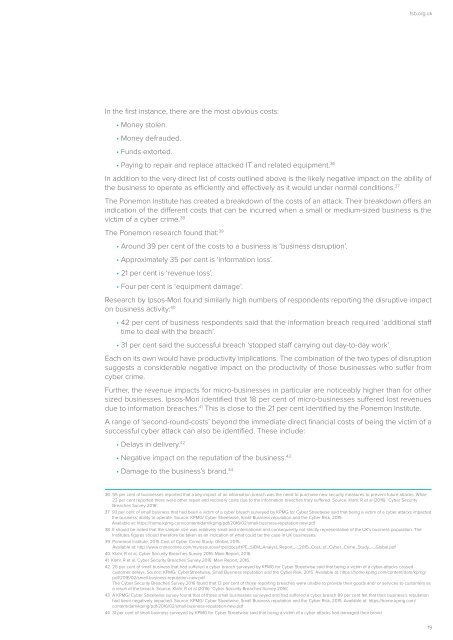CYBER RESILIENCE HOW TO PROTECT SMALL FIRMS IN THE DIGITAL ECONOMY
FSB-Cyber-Resilience-report-2016
FSB-Cyber-Resilience-report-2016
You also want an ePaper? Increase the reach of your titles
YUMPU automatically turns print PDFs into web optimized ePapers that Google loves.
fsb.org.uk<br />
In the first instance, there are the most obvious costs:<br />
• Money stolen.<br />
• Money defrauded.<br />
• Funds extorted.<br />
• Paying to repair and replace attacked IT and related equipment. 36<br />
In addition to the very direct list of costs outlined above is the likely negative impact on the ability of<br />
the business to operate as efficiently and effectively as it would under normal conditions. 37<br />
The Ponemon Institute has created a breakdown of the costs of an attack. Their breakdown offers an<br />
indication of the different costs that can be incurred when a small or medium-sized business is the<br />
victim of a cyber crime. 38<br />
The Ponemon research found that: 39<br />
• Around 39 per cent of the costs to a business is ‘business disruption’.<br />
• Approximately 35 per cent is ‘information loss’.<br />
• 21 per cent is ‘revenue loss’.<br />
• Four per cent is ‘equipment damage’.<br />
Research by Ipsos-Mori found similarly high numbers of respondents reporting the disruptive impact<br />
on business activity: 40<br />
• 42 per cent of business respondents said that the information breach required ‘additional staff<br />
time to deal with the breach’.<br />
• 31 per cent said the successful breach ‘stopped staff carrying out day-to-day work’.<br />
Each on its own would have productivity implications. The combination of the two types of disruption<br />
suggests a considerable negative impact on the productivity of those businesses who suffer from<br />
cyber crime.<br />
Further, the revenue impacts for micro-businesses in particular are noticeably higher than for other<br />
sized businesses. Ipsos-Mori identified that 18 per cent of micro-businesses suffered lost revenues<br />
due to information breaches. 41 This is close to the 21 per cent identified by the Ponemon Institute.<br />
A range of ‘second-round-costs’ beyond the immediate direct financial costs of being the victim of a<br />
successful cyber attack can also be identified. These include:<br />
• Delays in delivery. 42<br />
• Negative impact on the reputation of the business. 43<br />
• Damage to the business’s brand. 44<br />
36 55 per cent of businesses reported that a key impact of an information breach was the need to purchase new security measures to prevent future attacks. While<br />
23 per cent reported there were other repair and recovery costs due to the information breaches they suffered. Source: Klahr, R et al (2016). ‘Cyber Security<br />
Breaches Survey 2016’.<br />
37 93 per cent of small business that had been a victim of a cyber breach surveyed by KPMG for Cyber Streetwise said that being a victim of a cyber attacks impacted<br />
the business’ ability to operate. Source: KPMG/ Cyber Streetwise, Small Business reputation and the Cyber Risk, 2015.<br />
Available at: https://home.kpmg.com/content/dam/kpmg/pdf/2016/02/small-business-reputation-new.pdf<br />
38 It should be noted that the sample size was relatively small and international and consequently not strictly representative of the UK’s business population. The<br />
Institutes figures should therefore be taken as an indication of what could be the case in UK businesses.<br />
39 Ponemon Institute, 2015 Cost of Cyber Crime Study: Global, 2015.<br />
Available at: http://www.cnmeonline.com/myresources/hpe/docs/HPE_SIEM_Analyst_Report_-_2015_Cost_of_Cyber_Crime_Study_-_Global.pdf<br />
40 Klahr, R et al, Cyber Security Breaches Survey 2016: Main Report, 2016.<br />
41 Klahr, R et al, Cyber Security Breaches Survey 2016: Main Report, 2016.<br />
42 26 per cent of small business that had suffered a cyber breach surveyed by KPMG for Cyber Streetwise said that being a victim of a cyber-attacks caused<br />
customer delays. Source: KPMG/ CyberStreetwise, Small Business reputation and the Cyber Risk, 2015. Available at: https://home.kpmg.com/content/dam/kpmg/<br />
pdf/2016/02/small-business-reputation-new.pdf<br />
The Cyber Security Breaches Survey 2016 found that 12 per cent of those reporting breaches were unable to provide their goods and/ or services to customers as<br />
a result of the breach. Source: Klahr, R et al (2016). ‘Cyber Security Breaches Survey 2016’.<br />
43 A KPMG/ Cyber Streetwise survey found that of those small businesses surveyed and had suffered a cyber breach 89 per cent felt that their business’s reputation<br />
had been negatively impacted. Source: KPMG/ Cyber Streetwise, Small Business reputation and the Cyber Risk, 2015. Available at: https://home.kpmg.com/<br />
content/dam/kpmg/pdf/2016/02/small-business-reputation-new.pdf<br />
44 31 per cent of small business surveyed by KPMG for Cyber Streetwise said that being a victim of a cyber attacks had damaged their brand.<br />
19


